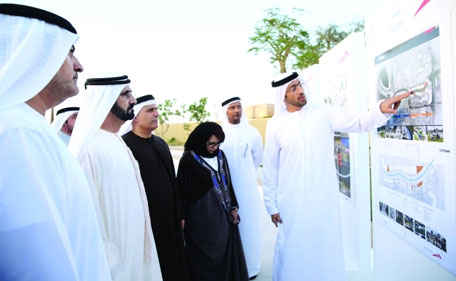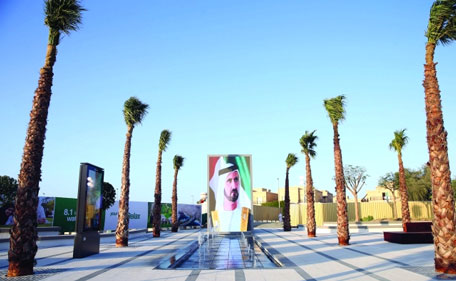- City Fajr Shuruq Duhr Asr Magrib Isha
- Dubai 04:32 05:49 12:21 15:48 18:47 20:04

His Highness Sheikh Mohammed inspected the progress of work on the Dubai Water Canal linking Business Bay with the Arabian Gulf. (Al Bayan)
His Highness Sheikh Mohammed bin Rashid Al Maktoum, Vice-President and Prime Minister of the UAE and Ruler of Dubai, inspected the progress of work on the Dubai Water Canal linking the Business Bay with the Arabian Gulf in a 3-kilometre route passing through the heart of Dubai.
His Highness inspected the excavation works completed so far and bridges constructed on Sheikh Zayed Road, Al Wasl Road and Jumeirah Road. The project completion rate has so far reached 61 per cent.

Upon arrival at the project site near Al Safa Park, Sheikh Mohammed was received by Director General and Chairman of Roads and Transport Authority (RTA) Mattar Al Tayer; Chairman of Meydan Group Saeed Humaid Al Tayer; and several directors and engineers.
At the start of the tour, Sheikh Mohammed was briefed by Al Tayer on the progress of the project which included the completion of the construction of the northern bridge on Sheikh Zayed Road in the direction from Abu Dhabi to Dubai. The bridge, which extends one kilometre, comprises eight lanes.
Construction works for the southern bridge in the direction from Dubai to Abu Dhabi will commence in a few days after diverting traffic to the northern bridge in order to make way for the remaining excavation works of the canal underneath the bridges on Sheikh Zayed Road.
Providing further detail on the project works Al Tayer said: “Work on the Dubai Water Canal Project is progressing according to the approved timeline and the completion rate of the project has so far touched 61 per cent, while completion rate of bridges on the Sheikh Zayed Road has topped 70 per cent.
“Construction works for the project are expected to be completed next August. The completion rate of bridges on Al Wasl and Jumeirah roads have reached 67 per cent and are expected to be opened by the end of July this year.”
The completion rate of the excavation works for the canal has reached 52 per cent and drilling works are set for completion by the end of September 2016.
His Highness Sheikh Mohammed reviewed designs and models of three pedestrian bridges to be constructed on the Dubai Water Canal, along with the design options for a walkway, running track, patios featuring interactive screens, sitting areas overlooking the Canal, state-of-the-art innovative lighting, and landscaping works.
The Walk of the Dubai Water Canal will be linked with the running track and the Walk of the Jumeirah Corniche, extending 7 kilometres.
Sheikh Mohammed also reviewed the designs of smart lighting poles which can be controlled via a smart app.
A total of 37 lighting poles have been installed in the northern bridge on Sheikh Zayed Road extending 899 meters, along with lighting fixtures on the footpath extending 271 metres.
“Lighting units are controlled via special smart apps based on a database for tracking the lighting condition, and sharing information and operational commands.
“The entire area is monitored by smart surveillance cameras focused on pedestrians whose footage will be wirelessly transmitted to the site control hub.
“These cameras are capable of identifying individuals through face-recognition technology.
“The works also include the installation of smart WiFi systems enabling the RTA to interact with social media through 3G technology,” explained Al Tayer.

Property development projects
Sheikh Mohammed was also briefed by Al Tayer about property and urban development projects to be built on the two banks of the Dubai Water Canal.
The floor area of these structures extends to 4.689 million square meters, and the project includes 5,345 residential units and 948 hotel rooms. The commercial floor area extends to 605 thousand square metres.
The project comprises the following districts; Gate Towers, Jumeirah, and Peninsula (Beach).
The Gate Towers bridge at the entrance of the Canal will stand out as a unique global landmark, encompassing a three-level mall built above the Canal spanning a floor area of about 300,000 square metres and featuring 434 retail outlets and restaurants.
The roof of the mall has been designed as a green park providing an optical connection between its greenery and that of Safa Park.
The Gate Towers project will include a five-star hotel, hotel apartments, and branded apartments.
Property developments on the Canal include four residential towers linked with Safa Park, about 500 retail outlets and restaurants, and 1,141 residential units.
About 200 outlets and restaurants and 211 residential units will be constructed on both sides of the Canal.
The Dubai Water Canal project will peak at the Delta where a peninsula will be formed, adding more than one kilometre to the new beach of the Jumeirah Beach Park. This expansion will create a space for deluxe property development projects in the Marina in an area featuring more than 60 marinas, 1,817 residential units, 957 five-star hotel rooms, and 347 retail outlets and restaurants.
Three contracts
Due to the massive construction works required for the Dubai Water Canal project, and as part of RTA’s commitment to ensure the project is completed on time, the construction works have been split into three contracts; the first, which costs Dh580 million, comprises the construction of a bridge of eight lanes in each direction on Sheikh Zayed Road above the course of the Canal that allows free navigation round-the-clock.
This also includes modifying lanes of impacted roads to ensure integrated traffic movement between the two banks of the Canal, which impacts an 800 metre-long sector of Sheikh Zayed Road.
The project also includes shifting existing utility lines impacted by the route of the Canal, in addition to lighting works and water fountains on the bridge.
The contract for Phase II of the project, costing about Dh384 million includes constructing bridges on Al Wasl and Jumeirah Roads across the Water Canal that allows the passage of yachts of up to 8.5 metres in height.
It also includes the construction of a free multi-tier interchange to link the traffic movement between Al Wasl, Al Hadiqa and Al Athar Roads to ensure smooth traffic flow after the completion of the project.
The contract also includes construction of bridges that will link to the proposed peninsula to the south of Jumeirah Park, shifting utility lines via conduits passing beneath the Canal, and providing spare ducts for services under the Canal to meet anticipated future needs.
The contract for Phase III of the Dubai Water Canal Project costing about Dh802 million includes digging the Water Canal, building the sides of the Canal linking the Dubai Creek with the Arabian Gulf, extending from Sheikh Zayed Road and passing by Al Safa Park and Jumeirah 1 and terminating in the Arabian Gulf at the southern part of the Jumeirah Beach Park.
The project includes the construction of three pedestrian bridges linking the two shores of the Canal and four marine transit stations to bolster the role of marine transit services.
Phase III also includes land-filling works to build a man-made peninsula along Jumeirah Park, which will double the beach line of the Park, increase the park area, and offer space for further leisure activities.
Mohammed releases book on UAE project to explore Mars
His Highness Sheikh Mohammed bin Rashid Al Maktoum, Vice-President and Prime Minister of the UAE and Ruler of Dubai, has said that following in the footsteps of our great-grandfathers, we have great dreams and ambitions which start from the sky, and we will look again for the stars to build our glory.
In the preface to his book on the ‘UAE Project to Explore Mars’, His Highness Sheikh Mohammed writes, "In December 2, 1971, the first man-made spaceship in the history landed on Mars which marked the beginning of a new scientific era in the history of mankind.
“On the same day, our forefathers at the Union House announced the establishment of the UAE to kick off a different march which aimed to build the Emirati nation.
"After only fifty years, in 2021, the two marches will meet at a point 60 million kilometres away from us, where Emirati nationals will add to the march of human knowledge a new impetus with an Arab imprint."
The book titled ‘Hope Probe and the UAE Project to Explore Mars," includes the various stages of the project and the reason behind the UAE's decision to launch this project. Sheikh Mohammed's introduction also discusses the history of the exploration of Mars as well as the benefits to humanity of the exploration of the planet.
Sheikh Mohammed congratulated everyone associated with the programme.
Sheikh Mohammed said, ''In a march that extended for 1,000 years, the Arab and Islamic civilisation led the world to new horizons of knowledge and opened up new routes for humanity as well as developing, for the sake of humanity, amazing theories and inventions.
“Our great-grandfathers explored the stars and seas as explorers, traders and scientists to build their glorious civilisation.
“Today, we resume our mission to explore the stars so as to build the future of our generations."
The book provides a comprehensive national reference of the UAE's innovative project to explore the Planet Mars, giving the reasons behind the UAE government's desire to develop space sector with Emirati expertise, in order to make 'Probe hope to explore Mars' one of its achievements, and not its conclusion.''
Here is the full text of Sheikh Mohammed's preface to his book:
''In a march that extended for 1,000 years, the Arab and Islamic civilisation led the world to new horizons of scientific knowledge and opened up new doors for mankind and provided new and amazing theories, inventions and discoveries, laying laid the foundation stone for a new stage in human history.
“Our great-grandfathers explored the stars and seas as explorers, traders and scientists to build their glorious civilisation. Today, we resume our mission to explore the stars so as to build the future of our generations."
"Science in our civilisation, bringing together astronomy, chemistry, mathematics, medicine and other sciences, was the product of minds which had an integrated concept of the world around them.
“Our illustrious cities, like Granada, Baghdad, Damascus and others became hubs for science and knowledge, hosting scientists such as Ibn Hayyan, Ibn Sina, Ibn al-Haytham, Muhammad ibn Musa al-Khwarizmi, Ibn Majid and others who were teachers of mankind for centuries. "
''Our great-grandfathers explored the stars, the sky and the planets and set off on the high seas as traders, scientists and explorers. They explored the stars and studied the seasons of the year and their divisions, the months. They also explored other sciences and led the march of an unprecedented civilisation. Today, it's time to look again to those stars to build the future of our generations."
"Years and ages have passed. The attention of mankind is once again exploring the stars and looking into Space.
“On December 2nd 1971, the first man-made vehicle landed on Mars, the Soviet Space ship, Mars 3.
“This represented the emergence of a new scientific and knowledge era in the history of humanity. On the same day, our fathers announced, at the Union House, the establishment of the UAE which marked the beginning of a new march of building of the citizens of the UAE.
“After only 50 years, in 2021, these the two marches will meet in a point at a point nearly 60 million kilometres away from us, where UAE citizens will add to the process of human knowledge, launching a new dimension of momentum and a different kind of Arab imprint. We have great dreams and ambitions which start from the sky, and we will look again for the stars to build our glory."
![]() Follow Emirates 24|7 on Google News.
Follow Emirates 24|7 on Google News.